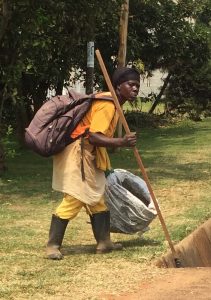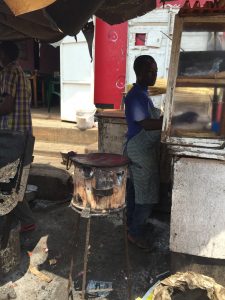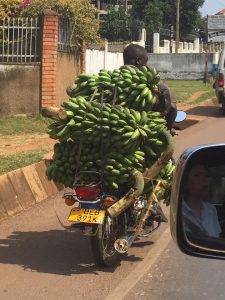 After visiting Uganda and Kenya for a bit more than a week, I am sure of one thing: what I don’t know could fill an encyclopedia. It would be presumptuous of me to claim anything but the most superficial knowledge of Africa. This is true, even after I was fortunate to spend most of the time learning from true world-class experts in the Horn of Africa, courtesy of the fine lecture series put on by the Reef Valley Institute.
After visiting Uganda and Kenya for a bit more than a week, I am sure of one thing: what I don’t know could fill an encyclopedia. It would be presumptuous of me to claim anything but the most superficial knowledge of Africa. This is true, even after I was fortunate to spend most of the time learning from true world-class experts in the Horn of Africa, courtesy of the fine lecture series put on by the Reef Valley Institute.
But I feel compelled to share a few thoughts. Gary Kebbel, a colleague at school who has spent more time on the continent than I, told me before I went that Africa can change you for life. Similarly, my daughter, Abigail, who spent a semester in west Africa, found that the place changes one’s views of many things, from ghastly poverty to the often-trivial things we in the First World regard as problems.
It will take time before I can tell whether my short stay in Africa – in mostly privileged conditions – will change me. My semester teaching in China in 2011 certainly did that, though four months is a lot longer than 10 days. But I must admit that I have a slightly broader outlook on things from just this short stint – a wider outlook on the U.S., as well as on the rest of the world.
So, here are a few impressions from someone who parachuted in:
First, life in Africa can be brutal and is, at best, a daily struggle for millions of people. Folks in the Horn area and elsewhere are subject to famines, terrorism, war and disease. The poverty in Nairobi and even in smaller places such as Entebbe takes one’s breath away. People scavenge waste heaps for recyclable material and then someone sets fire periodically to the dumps to pare back the volume, tossing off smog-boosting smoke. Many in Nairobi live in dire slums, in huts topped by corrugated steel, because it’s far too costly to snare an apartment. The photos here, shot by my son, Daniel, offer a glimpse of those in Uganda who are relatively better off.
The dilemma of such poverty in Africa is a riddle. When one looks at how China has lifted millions out of destitution and built a solid middle class over the last 30 years – after Chinese leaders opened their economic system to capitalism – one can only wonder why the same phenomenon hasn’t occurred in so many parts of Africa. Why have manufacturers such as Foxconn not flocked to the Horn to take advantage of cheap labor, building iPhones for world markets and providing jobs? Why have local entrepreneurs not done the same?
It may be that the stability insured by the Chinese political system allowed for growth and that leaders in the often volatile African countries cannot deliver that same security. Will entrepreneurs invest millions in plants when one can’t be sure of who will be in charge and whether revolution might unsettle everything? The last 50 years in many of the Horn countries have been marked by repeated changes in governance, with upheaval, cronyism and self-dealing by leaders, compared to which China’s Communist Party has been an oasis of stability and continuity. Where would you invest if you ran a multinational or even were a homegrown entrepreneur?
On this front, there are grounds for hope, though. The Chinese, as it happens, are expanding their military presence in Djibouti with plans for up to 10,000 soldiers to be based there. Can the capitalists of China not be far behind? Would Foxconn, for one, see this a great spot to escape the comparatively high wages and labor shortages on its home turf? I’m persuaded that nothing can lift the living standards in places such as Ethiopia, Somaliland, Uganda and Kenya more than factories that can provide jobs and income for thousands. It will take stability to bring in such factories, to draw investors.
How ironic would it be, though, if the Chinese, aided by their military, ride to the rescue and bring heightened living standards to Africa when longtime capitalists from the West have failed to do so? Indeed, the northeastern corner of Africa is awash in nongovernmental organizations staffed by well-meaning Westerners who offer helping hands and hearts in the region – and who do vital work, especially in health. But they can’t hold a candle to the roaring dynamo that capitalism has been for China, a place unhelped by NGOs for most of the last few decades. Still more irony there.
Second, I was struck by what life in a police state is like. Nairobi, in particular, is a place where both the wealthy and the just-above-poverty level folks live behind cinderblock walls and concertina wire, usually guarded by security service people in military-style uniforms who pack submachine guns. Heavily armed men are everywhere. They make for a dystopic panorama straight out of end-of-the-world sci-fi movies. One can have a wonderful life, I imagine, behind such walls. But who really wants that? Who wants to emerge to see squalor not far from the tall gates?
In the U.S., many people have electronic security systems in their homes and some wealthy people live in gated compounds or on estates surrounded by fences. But most of us live in open neighborhoods where one skips a few steps across a lawn to front doors and windows that would take nothing but a small hammer to defeat. That, to me, is a far better way to live than to exist in a perpetual state of insecurity and fear, unable to stroll around a neighborhood on cool evening or feel comfortable taking a quick run.
Yes, crime is a problem in the U.S. and, yes, the proliferation of guns is a true tragedy. But in Uganda and Kenya, guarding against theft or home invasion is a daily challenge that changes the look and feel of cities. Everywhere I went in Nairobi, I walked through metal detectors and had guards run mirrors beneath the cars I was in, and I grew inured to the sight of young people in fatigues carrying weapons that could take out a pack of attackers. In Nairobi, one goes nowhere without a driver and no one goes out at night.
Who could possibly want that sort of life? It’s no wonder that so many Africans look to the U.S. or Europe for far better opportunities and for simple safety. And, if one wants to see an argument against income inequality and in favor of the development of strong middle classes, just check out Africa. The gap between the haves and have-nots is a Grand Canyon and that, and the desperate levels of poverty, make for awful insecurity and crime.
 Third, the people I came in contact with were uniformly delightful. A friend who has spent years in the region said that while the U.S. and the West in general provide a “transaction-based society,” where people buy and sell services and vanish from one another’s lives, the African societies in the Horn especially are “relationship-based.” People want to get to know one another, not merely do business. Take the time to ask how people are doing, this friend said, and you will get by far better, even in the most mundane things. Security guards in Nairobi would see books I was carrying and start conversations about them, and not short ones. A driver and I had long chats about the importance of education, along with local and international politics.
Third, the people I came in contact with were uniformly delightful. A friend who has spent years in the region said that while the U.S. and the West in general provide a “transaction-based society,” where people buy and sell services and vanish from one another’s lives, the African societies in the Horn especially are “relationship-based.” People want to get to know one another, not merely do business. Take the time to ask how people are doing, this friend said, and you will get by far better, even in the most mundane things. Security guards in Nairobi would see books I was carrying and start conversations about them, and not short ones. A driver and I had long chats about the importance of education, along with local and international politics.
It was extraordinary to see how friendly and engaging — and often well informed — the people I came across were, especially about the U.S. Indeed, it surprised me to have people fretting over strained race relations and the turn in politics in the U.S., probably a product of watching CNN.
Finally, it’s hard to be optimistic about the future of the Horn of Africa. Will the walls ever come down around the compounds? Certainly, in places such as Nairobi there is development, the construction of grand complexes of housing, offices and shopping in areas such as the Westlands, not far from the foreign embassies. But will there be enough, and will it provide well-paying jobs for enough people? And, in Somalia, we are seeing steps toward governance, perhaps toward reestablishing a central state, even as Al-Shabaab controls so much territory. Will the clans who run the place find a way to share power in the interest of all, not just some?
The daily struggles of so many people in the region, the persistent income inequality, and the troublesome politics make it tough to see anything but a slow course upward. This part of the world certainly is unlike most of what we see in the U.S., even in areas hard-pressed by globalism’s downsides. And it’s far different from China or other parts of Asia. One can only wish the Horn’s leaders the kind of wisdom and opportunity it will take to find the economic engines the place so desperately needs.
